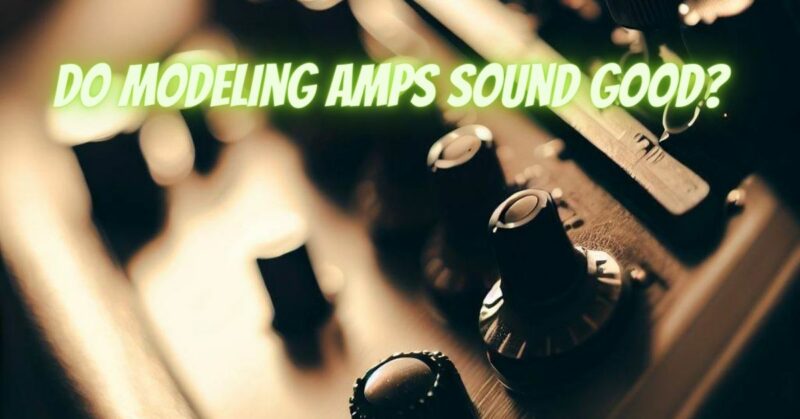The evolution of technology has dramatically transformed the world of music and sound, giving rise to digital wonders like modeling amplifiers. These versatile devices promise a cornucopia of tones and effects, raising the question: Do modeling amps truly sound good? Let’s explore the intricacies of modeling amp sound quality and the factors that influence their sonic prowess.
The Digital Wizardry:
Modeling amps are the wizards of the amplifier realm, harnessing advanced digital processing to emulate a spectrum of iconic amplifier tones, effects, and cabinets. This emulation is achieved through complex algorithms that recreate the sonic characteristics of renowned amplifiers, from vintage classics to modern powerhouses.
Factors Impacting Sound Quality:
- Quality of Modeling Technology: The foundation of sound quality in modeling amps lies in the quality of the modeling technology. Advanced algorithms and digital processing can replicate nuanced tonal qualities, capturing the essence of the original amplifiers.
- Amp and Effect Models: The accuracy of individual amp and effect models greatly influences the sound quality. High-end modeling amps feature meticulously crafted models that capture not only the tonal characteristics but also the dynamic response and nuances of the original gear.
- Digital-to-Analog Conversion (DAC): The DAC within the modeling amp is responsible for converting digital signals back into analog audio. A high-quality DAC ensures accurate translation of the digital emulation into pleasing audible tones.
- Speaker Quality and Cabinet Emulation: The speaker quality and cabinet emulation algorithms play a pivotal role in the final sound. Advanced modeling amps often include various cabinet options, allowing you to match your chosen amp model with appropriate virtual cabinets for an authentic sound.
- Amplifier Build and Components: The overall build quality of the modeling amp, including the quality of internal components and the analog signal path, impacts the sound’s fidelity.
The Verdict on Sound Quality:
The question of whether modeling amps sound good can be answered with a resounding “yes,” provided certain conditions are met:
- Quality of the Amp: High-end modeling amps from reputable manufacturers invest heavily in research and development to achieve top-tier sound quality. These amps are engineered to provide authentic tones and inspiring playing experiences.
- Calibration and Adjustment: Achieving the best sound from a modeling amp often requires careful calibration and adjustment. Spend time fine-tuning the settings to match your playing style and preferences.
- Performance Setting: Modeling amps excel in live performances due to their versatility. Onstage, the sound quality can be remarkably convincing, allowing you to switch between diverse tones seamlessly.
- Recording and Practice: For recording and practice scenarios, modeling amps provide convenience and excellent sound quality. They’re often equipped with direct recording capabilities that capture studio-quality tones.
Personal Perception and Artistry:
It’s important to note that sound quality is inherently subjective. What sounds “good” to one person might not resonate with another. Musicians have different preferences, musical goals, and sonic aesthetics. While some might find modeling amp tones to be rich, dynamic, and authentic, others might prefer the distinctive characteristics of traditional tube amplifiers or other analog setups.
In the end, whether modeling amps sound good depends on your expectations, the specific amp model, and how you use it. To make an informed decision, consider trying out different models, experimenting with settings, and, most importantly, trusting your ears to determine whether the sonic palette of a modeling amp aligns with your artistic vision and tonal preferences.


